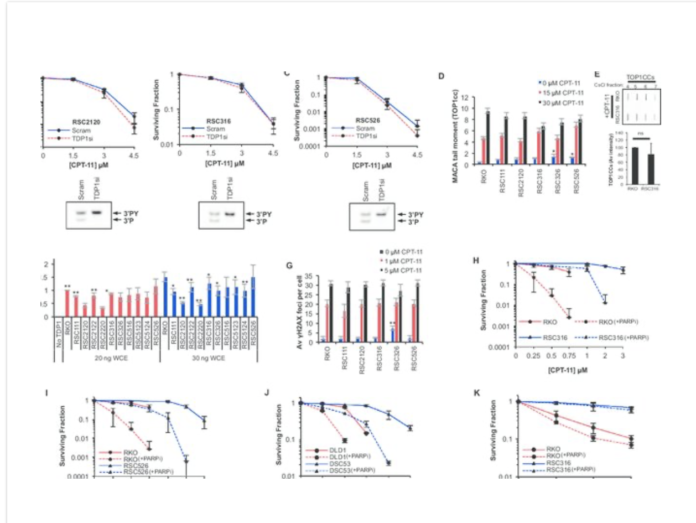The topoisomerase I (TOP1) inhibitor irinotecan triggers cell death by trapping TOP1 on DNA, generating cytotoxic protein-linked DNA breaks (PDBs). Despite its wide application in a variety of solid tumors, the mechanisms of cancer cell resistance to irinotecan remains poorly understood. Here, we generated col-orectal cancer (CRC) cell models for irinotecan resistance and report that resistance is neither due to downregulation of the main cellular target of irinote-can TOP1 nor upregulation of the key TOP1 PDB repair factor TDP1. Instead, the faster repair of PDBs underlies resistance, which is associated with perturbed histone H4K16 acetylation. Subsequent treatment of irinotecan-resistant, but not parental, CRC cells with histone deacetylase (HDAC) inhibitors can effectively overcome resistance. Immunohistochem-ical analyses of CRC tissues further corroborate the importance of histone H4K16 acetylation in CRC. Finally , the resistant clones exhibit cross-resistance with oxaliplatin but not with ionising radiation or 5-fluoruracil, suggesting that the latter two could be employed following loss of irinotecan response. These findings identify perturbed chromatin acetyla-tion in irinotecan resistance and establish HDAC in-hibitors as potential therapeutic means to overcome resistance.
Meisenberg C, Ashour ME, …. Downs JA, Ward SE, El-Khamisy SF. (2016). Epigenetic changes in histone acetylation underpin resistance to the topoisomerase I inhibitor irinotecan. Nucleic Acids Res. 45(3):1159-117
Professor of Molecular Medicine, Director of Research and Innovation and co-founder of the Healthy Life Span Institute, University of Sheffield, United Kingdom
Sherif El-Khamisy is a Wellcome Trust Investigator and co-founder of the Healthy Lifespan Institute at the University of Sheffield. El-Khamisy lab studies how cells maintain genomic integrity and their impact on health. The lab uses interdisciplinary approach fusing genetics, chemistry and biology with clinical expertise. We use mouse and zebrafish models to stay ageing and multimorbidity at the molecular and organismal level. We link our molecular understanding to public health challenges through interactions with social scientists.



